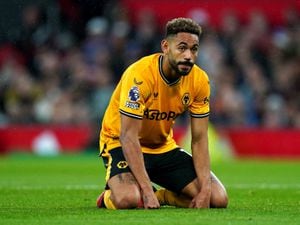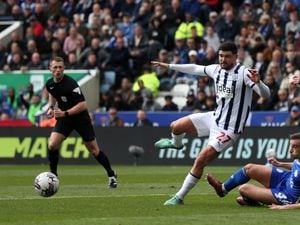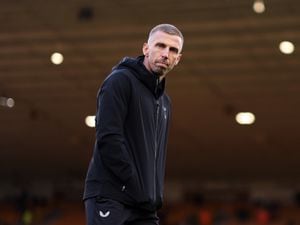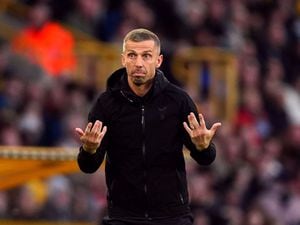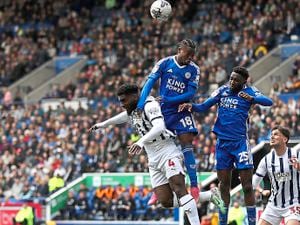Fifty years on for Albion's Bobby Hope
As Albion's latest young guns celebrate international glory the Baggies' most famous teenage star is marking a very different landmark.
As Albion's latest young guns celebrate international glory the Baggies' most famous teenage star is marking a very different landmark.
While George Thorne and Saido Berahino revel in England success and Chris Wood gears up for his World Cup adventure, Bobby Hope is reflecting on half a century ago at the Hawthorns.
It was the Spring of 1960 when the diminutive midfielder from Bridge of Allan in Stirlingshire made his Baggies bow at home to Arsenal and began a legendary career.
Fifty years on the cheery Scot remains involved with Albion, as they look to develop a new generation of home-grown stars.
But the 66-year-old does not know where the years have gone.
He said: "It doesn't seem like 50 years. Time passes that quickly. When I go home and see people I was at school with I always think do I look as old as that? And they probably think the same as me.
"But when you're involved in something like I have been involved in football for most of my life, you've always got something to look forward to on a Saturday.
"I think that's why time goes past quickly, but I am still enjoying it."
Hope fell for Albion immediately after arriving south of the border in 1959 as a Scotland schoolboy international.
The love affair had much to do with his formative weeks at the club, finding himself rubbing shoulders with some of the Baggies' all-time greats.
He recalled: "When I first came down here there were four of us from Scotland. We came just before the senior players came back, because we were on the ground staff and were introduced to our jobs.
"We trained in the morning, we would do our jobs in the afternoon for an hour or so and then we went training again.
"I will always remember the first one or two sessions, training just off the Birmingham Road, next to Sandwell Golf Club.
"I was training with people like Bobby Robson, Don Howe, Ray Barlow and Ronnie Allen - people who were household names, even in Scotland.
"West Brom weren't that well known in Scotland but they had people like Bobby Robson and Derek Kevan, who were England internationals. They were always renowned for playing good football.
"We were treated well and it was always known as a family club. We did 'road work' in the first week, when we never saw a ball.
"We were just running so many miles a day, which was pretty hard if you had come straight from school into it.
"But, in the afternoon, we used to get the ball out and they would mix us up, and that's what I used to train with people like Bobby Robson. It was a great experience. The club were very good to us.
"They used to let us go home about once a month and we had good digs in one of the better areas of Birmingham. Maurice Setters lived there, and later on Bobby Robson and Jock Wallace lived in the same areas as us. That was just off Camp Lane.
"We walked every day to the Hawthorns and we used to change there, because we didn't have a training ground.
"As the years went by the training ground at Spring Road was built and we were one of the first clubs to have a training ground, although there was only one pitch then."
Eventually, Hope would follow two of his mentors into the pivotal role in Albion's midfield.
Just as Robson had done his best to fill the incomparable Barlow's boots, so Hope was given the role of midfield creator-in-chief when the future England manager left for Fulham in 1961.
And his first taste of senior action came against another of his heroes.
He said: "Towards the end of the season there was nothing much at stake and I made my debut against Arsenal at the Hawthorns, playing against Tommy Docherty.
"I played OK. Docherty came in and congratulated me, which was really good because he was a Scotland international and somebody I looked up to and admired."
His subtle midfield probing, intelligent scheming and silky, inch-perfect passing would make him a cult figure still referred to today simply as 'Sir Robert' by a generation of Baggies diehards.
And it was in 1968 that his influence would help the Baggies lift their last major trophy - the FA Cup.
That day at Wembley, complete with Jeff Astle's famous winner against favourites Everton, still stands out as the highlight of a fabled Hawthorns career.
Hope said: "Playing-wise, the FA Cup win was the highlight because there were better players than me who never got a sniff of a medal.
"They were a great set of lads. We probably weren't the best team in the league, because we weren't consistent enough and didn't have a big enough squad.
"But in the cups we always seemed to rise to the occasion because we could always score goals. We had people like Tony Brown and Jeff Astle.
"There were good players in different positions but John Kaye was a big influence on the team, we had Tony and Jeff scoring the goals and Clive Clarke, who was never given the credit he deserved as a great goalscoring winger."
Hope departed Albion in 1972, playing for Birmingham and Sheffield Wednesday as well as enjoying spells in the United States.
But his legendary status with Baggies fans ensure his links to the Hawthorns remained strong, even during a successful spell as part-time manager of Bromsgrove Rovers that included two promotions and a second-place finish in the Conference.
Early in the 21st century, his official links to Albion were resurrected as he was lured back, eventually into the scouting role he still fills on a part-time basis.
He said: "Albion advertised for a youth team coach working in the centre of excellence, I came in and was offered a job.
"But I was only there 12 months or so before Gary Megson asked me to work with the seniors and I have been here ever since.
"We have had ups and downs over those years, but that's all part of the game."
And it's been great."

